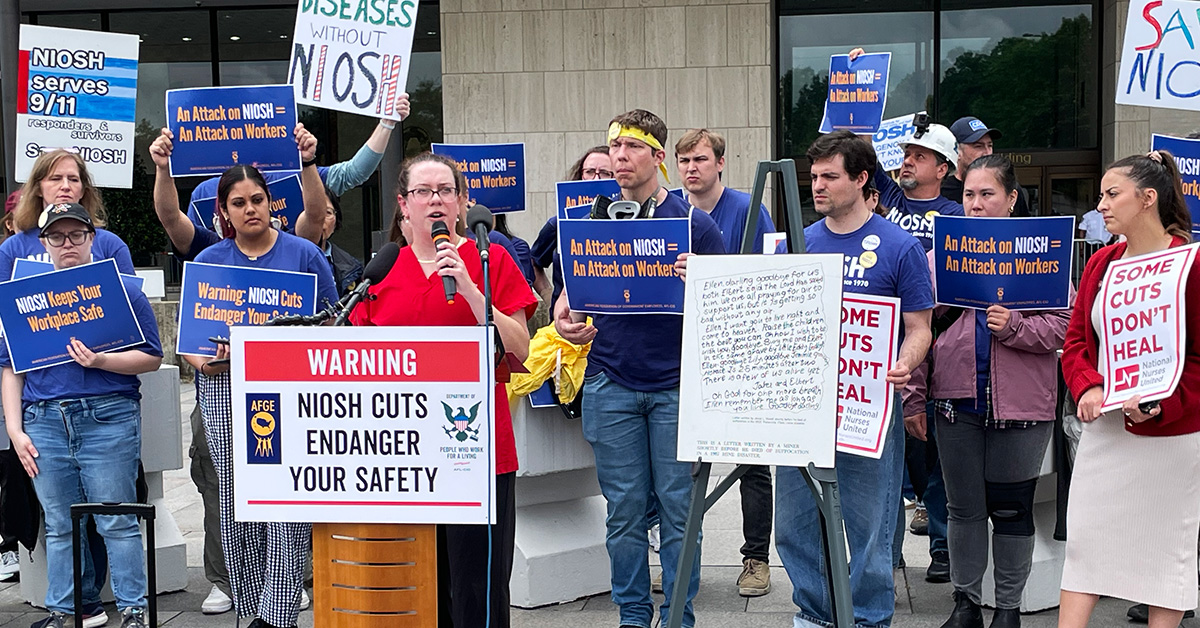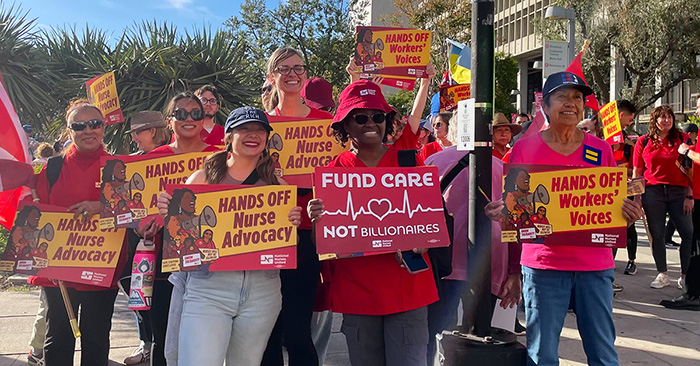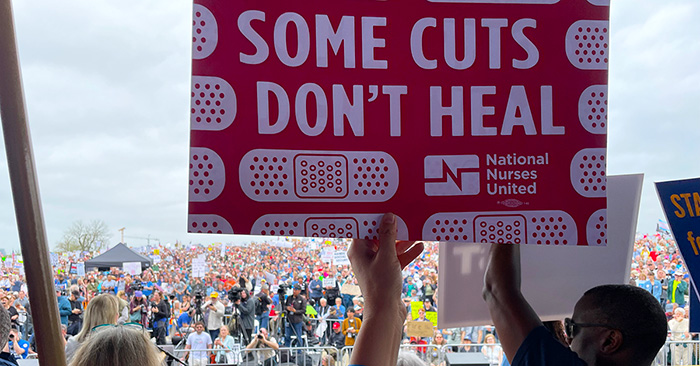Under Siege

The country’s entire public health infrastructure is under attack. What nurses must know and do to fight back.
By Chuleenan Svetvilas and Jane Thomason
National Nurse magazine - April | May | June 2025 Issue
“We know that health is not just about medical treatment. It’s also about the world that we live in and the support systems we all rely on,” said Cathy Kennedy, RN and a president of National Nurses United (NNU) at the “Hands Off!” mass mobilization event in Washington, D.C. on April 5. “Those include Medicaid, Medicare, Social Security, the Department of Health and Human Services (HHS), and the Veterans Affairs Administration.”
All those systems and many more have had thousands of federal workers fired and programs slashed by the current administration, including the Food and Drug Administration (FDA), the Environmental Protection Agency (EPA), and the Federal Emergency Management Agency (FEMA), to name a few. Weakened regulatory oversight and funding cuts will result in increased community and work exposure to environmental pollutants, unsafe food and products, infectious disease outbreaks, and inadequate disaster response.
The mass layoffs of federal employees have been unprecedented, devastating, and chaotic but it is the cuts to HHS that are extremely alarming to nurses and other health care workers. To begin with, HHS is headed by Robert F. Kennedy Jr., whose nomination NNU strongly opposed, stating that he “would be one of the most dangerous individuals to ever hold the top U.S. health care office … given his longtime opposition to lifesaving vaccines and his willingness to spread medical disinformation and unfounded health care conspiracy theories.”
HHS includes the Centers for Disease Control and Prevention (CDC), the Centers for Medicare & Medicaid Services (CMS), the FDA, and the National Institutes of Health (NIH). As of May, about 20,000 HHS employees have had their jobs cut or accepted buyouts. These devastating losses threaten the health and safety of patients, nurses, and other health care workers. To make matters even worse, Republicans in Congress are proposing almost $800 billion in cuts to Medicaid, which provides health care to nearly 1 in 5 Americans. This immoral proposal would deprive low-income, disabled, pregnant, senior, and pediatric patients of health care in favor of funding tax cuts for billionaires and corporations. NNU has been speaking out against these cuts, holding rallies, and lobbying members of Congress.
This intentional destruction of critical public health care staffing, resources, and infrastructure will have long-lasting and deadly consequences if we do not fight back. What follows is a brief overview of what is happening to our national public health infrastructure and what nurses can do to mobilize and protect our patients and ourselves.

The CDC has saved countless lives through its work monitoring, preventing, and responding to infectious disease outbreaks. As of this writing, the CDC has lost 2,400 staffers, or about 18 percent of its total staff, to reductions in force. Vital programs have been shut down, public communications have been frozen, important data is no longer being collected, and grants that fund essential infectious disease programs were eliminated. These cuts severely undermine the CDC’s ability to prevent infectious disease outbreaks and protect Americans' health.
On June 9, HHS Secretary Kennedy fired all 17 members of the Advisory Committee on Immunization Practices (ACIP), which determines vaccine policy and sets national immunization schedules. “A clean sweep is necessary to reestablish public confidence in vaccine science,” stated Kennedy in a press release. A few days later, he appointed eight people to ACIP, including well-known critics of vaccines and people who have little vaccine expertise.
ACIP was supposed to vote on updated Covid vaccine recommendations toward the end of June, but the vote was removed from the agenda. NNU submitted comments to ACIP members in advance of the meeting, urging “all new ACIP members to uphold the committee’s legacy and commitment to science and to ensure continued access to vaccines, including ensuring that Covid-19 vaccines — which have been proven to be safe and effective — remain available and accessible to RNs, other health care workers, and patients of all ages.”
Without a recommendation from ACIP, the latest Covid vaccine may not be available or accessible to everyone. The FDA granted limited approval to Moderna and Novavax’s updated Covid vaccines. Under the FDA’s new Covid vaccine regulatory framework, both vaccines are licensed for use only in adults aged 65 and older and those aged 12 to 64 years with at least one or more underlying risk factors. This means that it may not be available for healthy adults, including nurses and other health care workers who continue to be on the front lines of the Covid pandemic response.
This is an attack on the health and safety of our communities. People and their families across the country will bear the burden of disease and its long-term health impacts, especially with current efforts to systematically and structurally dismantle public health.
Another key part of the CDC is the National Institute for Occupational Safety and Health (NIOSH), which conducts research and makes recommendations for the prevention of work-related injury and illness. NIOSH’s stated mission is “to develop new knowledge in the field of occupational safety and health and to transfer that knowledge into practice.”
Nurses and other workers rely on NIOSH’s expertise to protect them from infectious diseases and other workplace hazards every day. NIOSH inspects and certifies respirators such as N95s and other personal protective equipment that saved lives throughout the Covid-19 pandemic.
Despite NIOSH’s critical role in protecting workers, on April 1, 90 percent of NIOSH employees were dismissed. As a result of powerful organizing by National Nurses United, the AFL-CIO, and other unions, on May 13, roughly a third of NIOSH staff were reinstated, including workers who conduct the respirator certification program. However, it is challenging for any of the current NIOSH divisions to do their work without the entire staff being fully reinstated. For example, NIOSH’s respirator certification program is having a difficult time procuring lab supplies and equipment calibration contracts because the CDC’s procurement office was laid off. NIOSH’s health hazard evaluation program has been reinstated but it relies on chemists to help process samples to determine what is causing the issue – but the chemists are gone, which means samples cannot be analyzed.
Additionally, Trump's budget request for fiscal year 2026 proposes an 80 percent reduction to NIOSH's budget, including zeroing out the respirator certification program. This would mean the loss of rigorous testing and regulation of respiratory protection equipment and the loss of assurance that a respirator will provide adequate protection from occupational hazards. Dismantling NIOSH puts every worker’s life at risk — from health care workers and firefighters to coal miners and factory workers.

Why are such essential, lifesaving programs being targeted for cuts? The goal of the current administration and its billionaire allies is to expand their profits as much as possible at the expense of working people. Medicaid, a safety-net program, is under attack so that anti-labor, pro-business forces can privatize these essential services. The Veterans Health Administration (VA) is also under attack and facing further privatization (see “Never Giving Up”).
“This current administration wants to weaken and privatize these programs that have helped millions of people stay alive, housed, and cared for,” said Kennedy at the “Hands Off!” event in April. “And without these programs, vulnerable seniors, low-income families, people with disabilities, and veterans will suffer.”
By disrupting, weakening, and ultimately eradicating protections, corporations will not be held accountable for treating workers with respect and providing safe workplaces. Without federal government agencies investigating complaints and conducting enforcement on wage theft, discrimination, and workplace safety, employers will be emboldened to increase these practices that harm workers and their families — and boost corporate profits.
But nurses can and must fight back. Major movements for social change in the 1960s and ’70s, led by labor unions, won other important health protections, including OSHA, NIOSH, EPA, and many others. Organized movements advocating for health protections have a long history of winning lifesaving programs in the United States.
These cuts to HHS and the VA are not inevitable. Nurses are leading a coordinated campaign to protect our right to health and to ensure that all workers have safe and just jobs. Nurses are patient advocates and have a moral and legal obligation to object to unsafe practices that endanger their patients.
Union nurses have important contractual rights and protections to do so without fear of retaliation for being effective patient advocates. Organized, unionized nurses can stand collectively with patients against the systemic forces that would prefer to isolate workers and undermine union power.
NNU nurses are leading the charge to protect the right to health, which includes:
- Fighting cuts to Medicaid, Medicare, VA, Social Security, and other social supports that patients rely upon to survive.
- Fighting for Medicare for All, a single-payer health care system that guarantees access to care for everyone at no cost.
- Protecting workers’ right to organize and form unions by advocating for the Protecting the Right to Organize Act and pushing back on attempts to rip up collective bargaining agreements.
- Fighting cuts to public health and preparedness infrastructure, including infectious disease surveillance, research, stockpiles, etc. that will mean the difference between life and death for patients and nurses in the next infectious disease event.
- Working to transform the economy from one focused on profits to one focused on caring for our communities.
Nurses will continue to fight for Medicaid, Medicare for All, and to fight against all cuts to HHS, including the reinstatement of all NIOSH staff. These standards and protections we have fought and won over decades of work all support every person’s right to health.
Chuleenan Svetvilas is a communications specialist at National Nurses United. Jane Thomason is lead industrial hygienist at NNU.